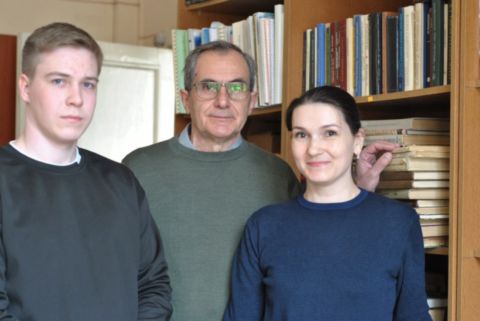Higher School Teachers’ Day is celebrated on November 19th. Why do people choose this profession, what do teachers like about their work, and how do various generations of students differ? Doctor of Sciences (Physics and Mathematics), Chief Research Fellow, Professor of the Department of Physics of Nanoscale Systems, Leading Research Fellow of the SUSU Research and Innovation Services Aleksandr Mirzoev answered all these questions.
– Why did you choose the profession of a teacher?
– It is a family tradition. My father was a teacher of Physics, and my mother taught Mathematics at school. In addition, the example of many outstanding lecturers, such as professors and associate professors of the Department of Theoretical Physics of the Faculty of Physics and Technology of the Ural Polytechnic Institute (now Ural Federal University), influenced my choice.
– How do you improve your skills in your profession? Do you read additional literature, attend advanced training courses, or adopt the experience of your colleagues?
– Of course, I read additional literature and journal articles in my field. I take courses and participate in conferences.
– Could you please tell us about interesting moments in your teaching experience?
– I cannot remember anything particularly funny, but I have made two interesting observations from my teaching experience. First, student groups are very clearly divided into “good”, that is, hard-working, where students want to obtain knowledge, and “bad”, where students are not interested in studying. Apparently, this is due to the spiritual atmosphere in a group, which is formed from the first academic year and is determined by whichever people prevail there: lazy or hardworking. Second, there are different ways to introduce a student to science. You can strictly control the activity, not allowing possible mistakes, or you can give an interesting task and not interfere with getting “bumps and bruises”. It is interesting that the end results can be similar.
– What do you like about working with students?
– Their energy, a fresh look on things, the ability to use a computer and get information from the Internet.
– What do you see as the advantages of different generations of students?
– For our 1970s generation, knowledge had an obvious value, because in the Soviet times there used to be a clear correlation: the higher the level of education, the higher the standard of living. Therefore, we actually studied despite the shortage of books and the absence of the Internet. The perestroika generation still remembered that, but reality dictated new principles: it was better for the pushy and unprincipled. Those who wanted to study, studied conscientiously, but moved abroad. Those who wanted to build their lives according to the new rules needed other knowledge: the Criminal Code and the basics of doing business. Hence the explosive demand for economic and legal specialities. The 1990s-2000s generation had already adapted to the new conditions and understood what would be useful in life: for example, the ability to use a computer, and most importantly: good health and connections. They were athletic, active, had many friends. In the 21st century, a new principle began to spread: “Not to be, but to seem!”. Young people began to take care of their appearance, dress well, look and speak respectably, and even strived to get good grades – but rather more for show. I really want to hope that the changes in our country after the special military operation will bring a new generation of students to SUSU, in whom all the positive traits will be combined.
– What would you wish to young teachers whose career path is just beginning?
– I would wish them wisdom and patience, and also not to forget that they themselves were once students too!




